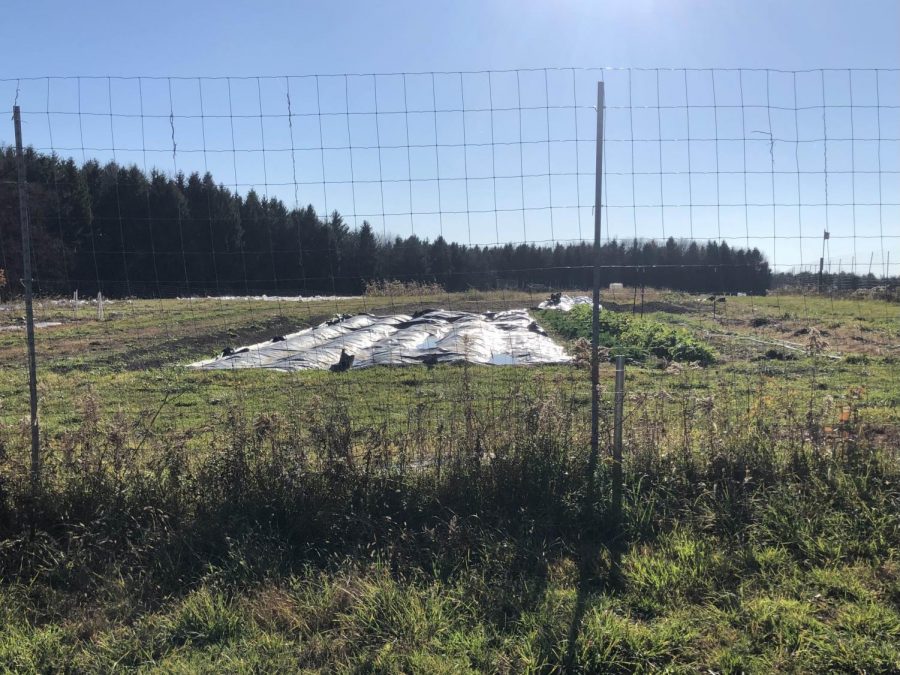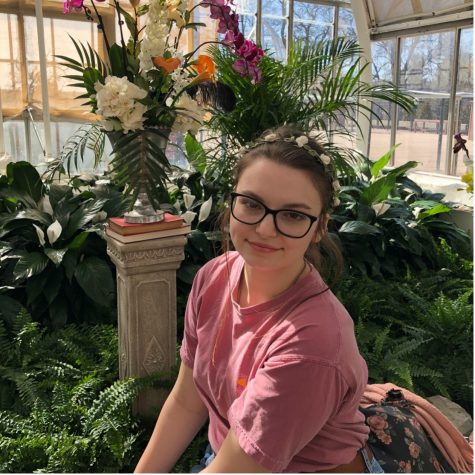Despite pandemic, commitment to sustainability still a priority for Chatham University
Chatham’s farm, Elsama, is located just a few minutes outside of Eden Hall, and produces the majority of the food on campus.
January 25, 2021
Anderson Dining Hall and the Eden Hall campus farm had to make adjustments to their practices starting in March 2020 to ensure the safety of students during the ongoing COVID-19 pandemic.
Fortunately, these adjustments have also prioritized Chatham University’s commitment to sustainability.
Currently, students receive compostable dinnerware at dining halls. The boxes themselves are made out of a recycled pulp paper, and the straws and cups are corn-based. The utensil packets also are made from a plant-based plastic.
The type of composting that Anderson Dining Hall partakes in is industrial composting with AgRecycle, a composting firm. This allows items such as meat, dairy, fish scraps and the bio-based plastics to be composted. Students are welcome to bring their compostable materials to Anderson Dining Hall or Café Rachel. It is important that compostable items are disposed properly in campus composting bins to ensure they are broken down effectively.
“AgRecycle used to visit twice a week, now they visit five days a week,” said Coco Lee, assistant director of dining services at Chatham. Recycling and trash pickup at Anderson Dining Hall occur six days a week.
A major contribution to this extra waste was the introduction of individual portions of food that are present for students to grab and go because of the pandemic.
Eden Hall’s farm also experienced some challenges because of COVID-19 and had to adjust its distribution of produce.
“When everything shut down in the beginning, we were the only thing to really stay open,” said Tony Miga, the director of Eden Hall’s farm. “It was unclear — and still is unclear, in some ways — what our outlets will be for what we are growing. … You can’t just stop and start [the farm]. We are working six to eight months out. The things that we are doing now are the stuff that will be harvested three months from now.”
During the pandemic, Eden Hall’s farm scaled back a bit but continued to grow produce. To distribute this produce, Chatham set up weekly produce shares for the community and partnered with a CSA program, or community supported agriculture program, in Sewickley. The farm also set up a pop-up produce stand during the summer to sell excess produce to local community members.
When students left campus last spring, Anderson Dining Hall did not experience a large increase in food waste. Chatham works closely with 412 Food Rescue, a nonprofit organization that collects and distributes excess food to other organizations that address people experiencing food insecurity. This food that would have been thrown out was instead delivered to those in need, according to Lee.
When the 2020-21 academic year began, the produce distribution at Eden Hall shifted again.
“The bulk of what we are growing now goes to Parkhurst,” Miga said. “This fall, from September to October, the majority of what we are providing Parkhurst is used at Shadyside.”
During the fall, for example, Eden Hall’s farm sent 60 to 80 pounds of tomatoes every week to the Shadyside campus.
Currently, only five acres of Chatham’s 30-acre growing area, Elsama, are being utilized, but Miga wants the farm to expand. Since the pandemic, the farm has recruited new graduate and undergraduate students.
“I really want as many people as possible to be involved and engaged,” he said. For the winter months, one of the farm’s primary tasks will be maple tapping to make maple syrup.
Interested students can reach out to Miga at [email protected]
Another decision Chatham made to lessen the risk of spreading COVID-19 was to prohibit students from using communal water fountains. This includes both standard water fountains and those that are motion sensitive to fill up reusable bottles.
Water bottles, as of now, can’t be purchased in Café Rachel, but Parkhurst does have some canned water on reserve in case of emergency.
Prior to the pandemic, Anderson had a green box program that allowed students to take a reusable container back to their dorms with their food. Currently, Parkhurst dining is working with Chatham to eventually move back to using the green box program and physical china when it’s safe to do so.
Lee is also looking forward to the day where Parkhurst can safely bring back the ice cream freezer.








Greg • Jun 2, 2021 at 8:33 am
I’m a neighbor on Ridge Road near Eden Hall campus.
Will the public be able to eat at the cafeteria in the future?
Thank you.
adviser • Jan 26, 2022 at 9:14 am
Hi Greg,
The Eden Hall website says, “The Barazzone Center is open to the public for breakfast, lunch, and dinner. For hours and other information, call the EBC Kitchen at (412) 365-1592.” If you would like more information you can visit the page on the EBC Kitchen: https://www.edenhall.chatham.edu/food-farm. Thank you for your comment!
– Communiqué Staff